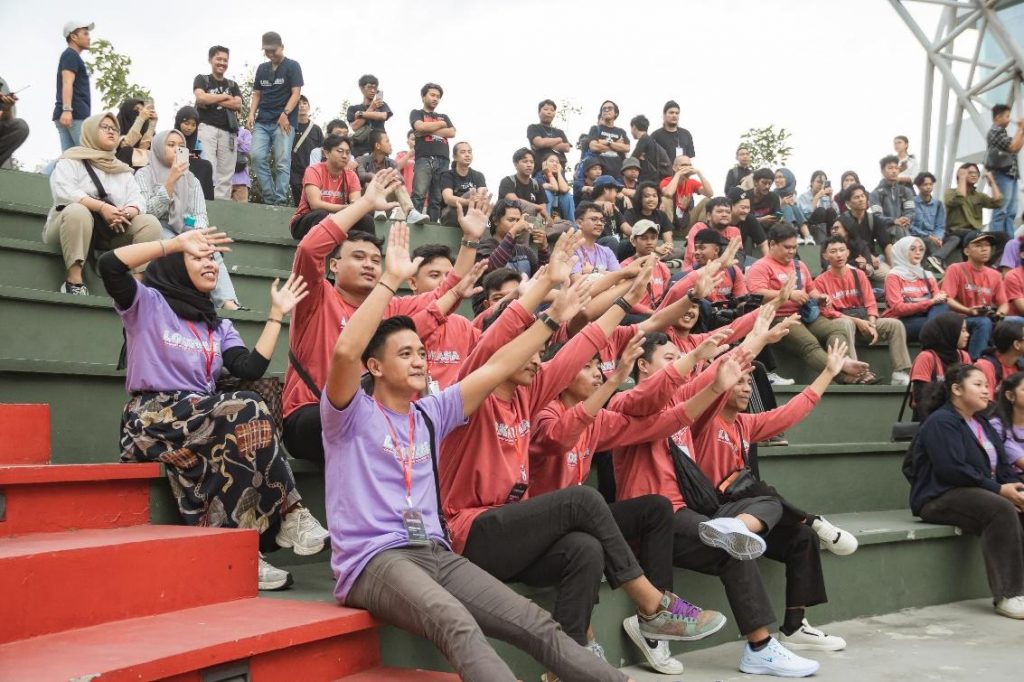
A Case Study on Cultural Preservation through Musical Arts
Lokovasia 2024: A Case Study on Cultural Preservation through Musical Arts
Faculty of Letters
Visual communication design
September 8, 2024
Learning and Students, Student Learning and Activities
SDG 12
On September 5, 2024, Universitas Negeri Malang (UM) held a spectacular event titled Lokovasia 2024, which carried the theme of cultural preservation through musical arts. This event was held in various iconic spots on the Universitas Negeri Malang campus, including in front of the Rectorate Building, Outdoor Learning Space (OLS), and in front of Jalan Veteran. With various traditional music performances, Lokovasia 2024 aims to promote sustainable cultural preservation and raise awareness of the importance of maintaining a balance between cultural production and environmental sustainability.
Lokovasia 2024 offers a different experience from previous years by holding performances in open spaces on campus. In front of the Rectorate Building, one of the most symbolic places at UM, the audience was treated to a traditional music performance that combined gamelan, angklung, and other musical instruments, creating a solemn yet inspiring atmosphere. The Rectorate Building, as the administrative center and intellectual symbol of the campus, is an ideal location to remind us of the importance of preserving cultural heritage amidst the increasingly strong current of globalization.
At the Outdoor Learning Space (OLS), the atmosphere is more interactive and casual, with musicians interacting directly with the audience, mostly students and lecturers. The performances at OLS feature collaborations between traditional music artists and young musicians, combining traditional instruments with modern elements. This is a real example of how cultural preservation can be done in a way that is relevant to the younger generation.
Meanwhile, in front of Jalan Veteran, a strategic location at one of the main gates of the campus, this event attracted the attention of the public and students passing by. In this place, traditional music performances were accompanied by regional dances, creating harmony between music and movement that reflects the richness of Indonesian culture. This performance aims to spread the message of the importance of responsible art consumption in public spaces.
Lokovasia 2024 highlights the importance of responsible art production, especially in the making of traditional musical instruments that often require raw materials from nature. The event invites the public to think about the environmental impact of the process of making musical instruments, such as gamelan made from metal or angklung made from bamboo. One of the topics of discussion that attracted attention was how local craftsmen can use sustainable materials in making musical instruments, as well as the importance of recycling practices to reduce waste.
Artists and craftsmen participating in Lokovasia 2024 also showcased musical instruments made from recycled materials, such as angklung made from bamboo waste and wind instruments made from recycled plastic. These are concrete examples of innovation in responsible consumption and production, where art and culture can flourish without harming the environment.
Lokovasia 2024 focuses not only on performances, but also on public education. At each location, there are educational booths that provide information on the importance of sustainable art consumption. The public is invited to support local musicians and craftsmen, while protecting the environment by choosing musical instruments and artworks that are produced responsibly. Participants are also invited to be more aware of enjoying and supporting traditional musical arts, including understanding the origins of musical instruments and their impact on the ecosystem.
The educational booths emphasized that traditional music is not only about preserving culture, but also about creating an environmentally friendly system. For example, efficient use of resources and new technologies in making musical instruments can reduce carbon emissions and waste. In addition, some musicians also talked about how they actively contribute to the green movement by reducing the use of non-environmentally friendly materials in their art.
The event also created a bridge between the academic community and local artists, promoting dialogue on how best to preserve traditional music arts. Several academics from Universitas Negeri Malang presented their research findings on preserving traditional music through a sustainable approach. They discussed the importance of innovation in music education to ensure that future generations continue to appreciate traditional arts, but also pay attention to their impact on the environment.
This collaboration strengthens Universitas Negeri Malang’s commitment to SDG 12, where the university plays an active role in encouraging responsible consumption and production through research, education, and development of traditional music arts. Lecturers and students are directly involved in developing innovative solutions to overcome the challenges faced in preserving culture sustainably.
Lokovasia 2024 shows that traditional music art is not only about preserving cultural heritage, but also about creating a sustainable and responsible ecosystem. By utilizing various spots on the Universitas Negeri Malang campus, this event managed to attract the attention of a wide audience, while spreading an important message.
Through collaboration between academics, artists, and the general public, Lokovasia 2024 has successfully demonstrated that cultural preservation can be done without sacrificing the environment. This is a concrete step towards a more sustainable future, where art and culture can continue to thrive alongside efforts to preserve the earth for future generations.